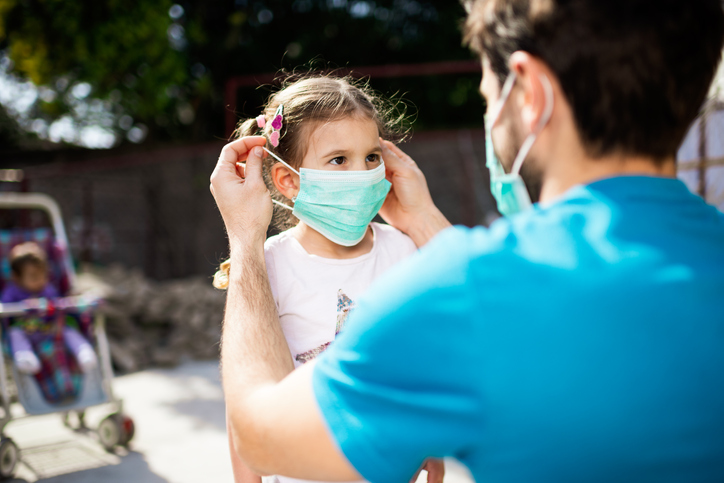By Lynn Hagan, PsyD, LCSW
Disasters, including pandemics, can be frightening. When a pandemic occurs, anticipate that families’ routines may not only be interrupted but the family will experience isolation to prevent spread of the disease.
Preparing, both mentally, physically, and emotionally, can often be the best thing you can do to help you and your family at that uncertain time.
Think about what is needed during the event and make a plan for your family so that you are prepared. Stock up (but do not hoard) food, water, and medications. Experts recommend that you have about three days to a week’s worth of supplies in your home in case of emergency. This includes about three months of necessary medication.
Having games, activities, and ways that children can communicate with friends (like email, text, or Zoom) ready for your children to make the time spent confined at home less stressful.
Monitoring of screen time is essential and making sure that the platform is appropriate for your child. If the level of infection risk increases, greater caution will be warranted. School may be disrupted for an extended time, so making sure that parents are in contact with teachers and the school system is essential. Older students, such as those in college, will receive information as to how to continue with studies online.
In addition to preparing physically, there are things which families can do to prepare and cope with extended social and physical distancing efforts. This can be the most challenging of all. It will require engagement of the family at many levels.
Empower: Children and adolescents are in a climate where they, like nearly everyone else, feel that they no longer have control over their lives. Something as simple as allowing them to choose an activity for the day can help them feel more in control. This can be as simple as keeping track of handwashing for the family, choosing an activity for a game night or what television show to watch.
It is important to model behaviors of good self-care. This includes maintaining proper hygiene (such as proper hand washing and tissue use); maintaining a good, balanced diet; drinking plenty of water (stress tends to dehydrate); and getting enough sleep.
Routines are essential for them as well as for adults. This provides a sense of control. Routines can include setting school times, reading hour, exercise, television time, and meals. This will give everyone some control of their environment during these times of uncertainty.
Support: Encourage communication and questioning. Talk about the information they are receiving and make sure the information you, as the adult, has is correct. Like adults, they may also be receiving misinformation from friends and social media that you would want to correct or research.
Validate Concerns. Let them know grandparents and people in nursing homes are getting the best care possible. Reassure them about their pets. Pets can be (and are) a great sense of comfort for the entire family. Be honest. If you are feeling anxious let them know but also assure them you know best how to keep the family safe.
Stay Calm: Talk to family members in a calm way. If adults are panicked or stressed, children will be as well. Stick to verified facts in a way that is age-appropriate and understandable. The Centers for Disease Control and Prevention is the official source for accurate and up-to-date information. Information from local and state health departments is vital and timely.
Control your own anxiety as much as possible. Anxiety can be as contagious as the virus. Maintain your flow of accurate, fact-based information. As much as possible, stay away from social media and news streams. Although well-meaning, social media can be filled with misinformation disguised as fact. Work your support systems and take care of your own health.
Boundaries: Remember that adults are in charge. Limit screen time focused on COVID-19 because a continuous flood of information can worry in children and parents. Remember that much of the information on social media may be heresay, rumors, and inaccurate.
Comfort and Reassurance: Provide reassurances. Tell children the reason family activities have been cancelled or postponed. Reassure that actions such as isolation will help contain and limit the spread of COVID-19. Remind the family of other times when things appeared hopeless and how the family overcame these struggles. Includes stories from your family’s history. These stories can be the cornerstone which cements family coping skills. They carry a great deal of emotional weight. Something like “remember when” stories to reinforce resilience within the family. It stresses that the family has been through trying times before and survived and thrived. Reliving these kinds of narrative helps the whole family to build resilience and hope.
Stay Informed: Check the Centers for Disease Control and Prevention website and your local health department and officials for informational updates and follow the instructions of your local health authorities.
It is highly likely that children and other family members know something about the pandemic on television or from a friend. Having your child tell you about the pandemic, rather than you telling your child about it, lets you know what misconceptions or misunderstandings he or she may have. This also empowers them to feel more confident in sharing information with adults.
Make sure that if you have to correct their information, you do it in a kind and loving way. You want the lines of communication to stay open. And, if you must correct the information, make sure that the information you give is indeed correct as well.
Resources

Lynn Hagan, PsyD, LCSW is a licensed clinical social worker in Texas and Louisiana. She has extensive experience in disaster and wartime trauma locally, nationally, and internationally.





